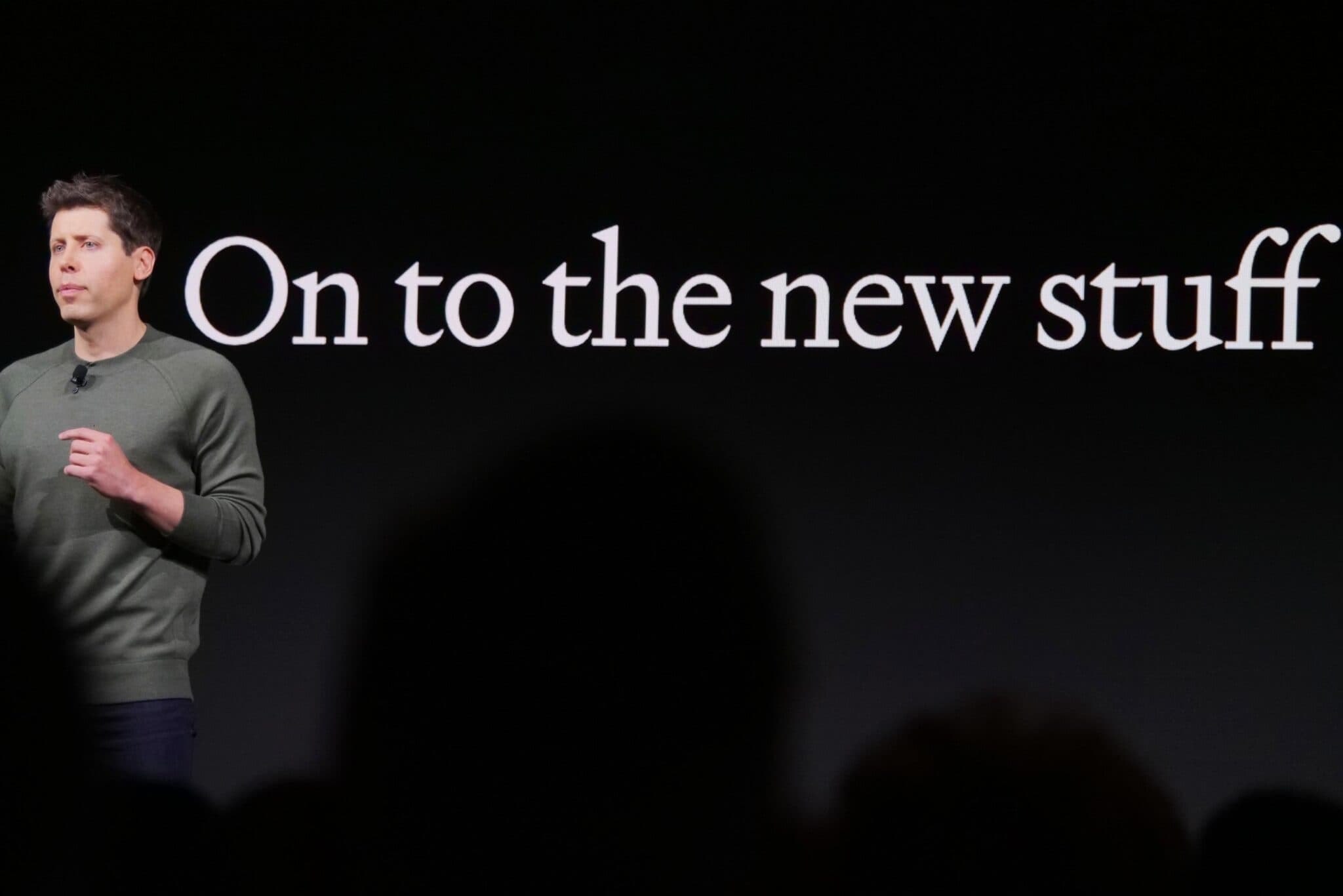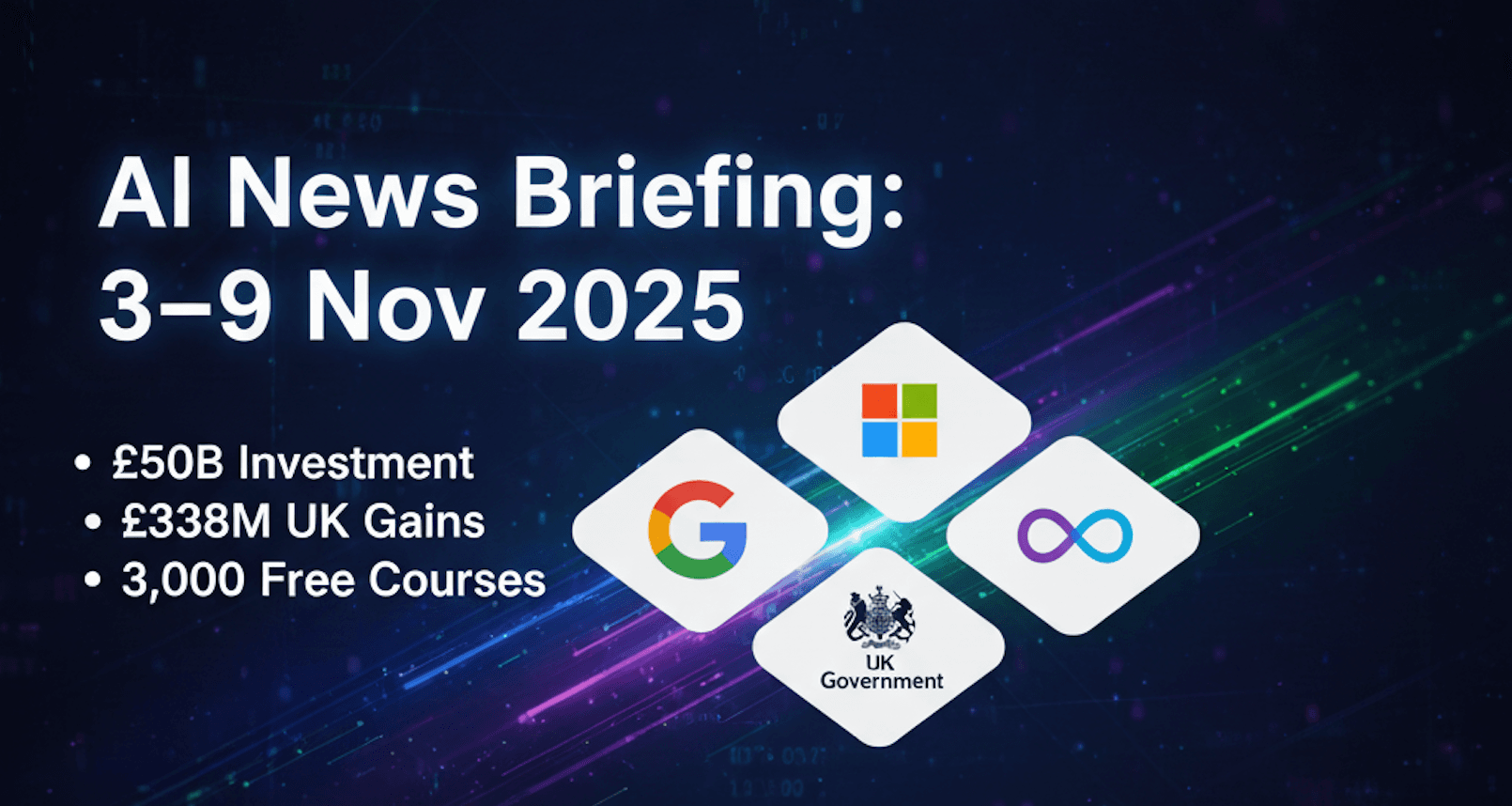AI Breakthroughs This Week: What UK Business Owners Need to Know (27 Oct - 2 Nov 2025)
Microsoft locked in 27% of OpenAI, Skills England launched £400bn AI training, and Google's Pomelli targets SMB marketing. Complete analysis of the week AI became genuinely accessible for UK businesses.
Jake Holmes
Founder & CEO

This week the AI industry shifted from infrastructure plays to direct SMB support. Microsoft secured 27% of OpenAI with a $250 billion commitment. The UK government announced £400 billion in AI skills investment. Google launched an AI marketing tool designed specifically for small businesses.
If you're running a UK business with £1-10M revenue and you've been waiting for the "right time" to deploy AI, this is it. The barriers just collapsed. The tools are ready. The economics finally make sense.
The bottom line: This week delivered the infrastructure, training, and tools that transform AI from enterprise luxury to SMB necessity. Here's everything that matters.
Why did Microsoft just secure 27% of OpenAI?
Quick answer: Microsoft secured 27% equity in OpenAI on 28 October with a $250 billion Azure commitment through 2032, providing stable API access and predictable pricing for UK SMBs deploying GPT models.
Microsoft secured 27% equity in OpenAI on 28 October with a $250 billion Azure commitment through 2032. This isn't just a big number – it's the stability guarantee UK businesses need to build on OpenAI's platform.
When you deploy ChatGPT for customer service or build applications on GPT-4, you need confidence the platform won't disappear or pricing won't suddenly triple. This deal provides that certainty. Microsoft has skin in the game worth hundreds of billions.
For UK SMBs: You can now confidently build business processes on OpenAI's platform knowing Microsoft's Azure infrastructure backs the entire operation. The risk of platform instability just dropped to near-zero.
What's this autonomous security researcher OpenAI just launched?
Quick answer: OpenAI launched Aardvark on 29 October, an autonomous security researcher that identifies and fixes code vulnerabilities without human intervention, potentially slashing cybersecurity costs for UK SMBs.
OpenAI launched Aardvark on 29 October – an autonomous AI that identifies and fixes code vulnerabilities without human intervention. It scans your codebase, finds security holes, and patches them automatically.
The timing couldn't be better. UK SMBs face escalating cybersecurity threats but can't afford £100,000+ annual security consultant fees. Aardvark democratises enterprise-grade security for businesses running on tight budgets.
OpenAI also enhanced ChatGPT's sensitive conversation handling the same week. UK businesses in healthcare, legal, HR, or financial services can now deploy ChatGPT for customer support with greater confidence in GDPR compliance.
The competitive advantage: Small businesses can now access security capabilities previously reserved for enterprises with dedicated security teams. This levels the playing field against larger competitors.
How big is Anthropic's revenue from Claude Code?
Quick answer: Claude Code launched for web on 20 October, generating $500 million in annualised revenue. UK SMBs can now accelerate software development at £20-200/month without command-line complexity.
Claude Code launched for web on 20 October, generating $500 million in annualised revenue. Available at £20/month (Pro), £100/month (Max), or £200/month (Ultra), UK SMBs can accelerate software development without wrestling with terminal commands.
The web interface removes the technical barrier that stopped non-developers from using AI coding tools. Your operations manager can now automate workflow processes. Your marketing director can build custom landing pages. No computer science degree required.
Claude for Life Sciences launched the same day, integrating with Benchling, PubMed, and 10x Genomics. UK life sciences SMBs can accelerate drug discovery and reduce research timelines from days to minutes.
Claude for Financial Services added an Excel add-in with real-time market data and pre-built Agent Skills including DCF models. UK financial services SMBs can automate complex analysis with minimal staff retraining.
For UK businesses: Anthropic built industry-specific versions of Claude that understand your sector's unique requirements. You're not adapting generic AI to your business – you're deploying AI purpose-built for your industry.
Why did Google build an AI marketing tool specifically for SMBs?
Quick answer: Google launched Pomelli on 31 October, an AI marketing tool designed specifically for SMBs that analyses websites to create "Business DNA" profiles and generates tailored campaign ideas with branded assets.
Google launched Pomelli on 31 October – an AI marketing tool designed specifically for small businesses. It analyses your website to create a "Business DNA" profile, generates tailored campaign ideas, and creates branded marketing assets automatically.
This addresses the single biggest pain point for UK SMBs: marketing expertise is expensive, but you still need to compete with larger companies running sophisticated campaigns. Pomelli gives you enterprise-grade marketing capabilities at SMB pricing.
Currently in beta for US, Canada, Australia, and New Zealand, but the UK launch is inevitable given our market size. Early adopters in other markets report 60-70% reduction in marketing asset creation time.
Google also released Gemini 2.5 Pro & Flash models with enhanced reasoning and native audio support. The Flash model offers 4-5x faster performance than Sonnet at one-third the cost – ideal for UK SMB customer service chatbots.
Google's new AI Mode in Search enables conversational, multi-part queries with visual inspiration. UK SMBs can expect more efficient research and market intelligence gathering.
Why this matters: The tech giants are finally building tools for your revenue bracket. You're not an afterthought – you're the primary target customer. The playing field just tilted in your favour.
What's Meta doing with $72 billion in AI infrastructure?
Quick answer: Meta reorganised into Meta Superintelligence Labs on 30 October with $72 billion capital expenditure, delivering more powerful AI features for Instagram, Facebook, and WhatsApp business accounts.
Meta reorganised into Meta Superintelligence Labs on 30 October with $72 billion capital expenditure for massive AI clusters. This isn't abstract research – it's infrastructure delivering tangible features to UK businesses using Meta platforms.
Meta's Q3 2025 earnings revealed over 1 billion people use Meta AI monthly. Their automated ad tools run at $60 billion annualised revenue, proving the technology actually works at scale.
For UK SMBs: The Instagram and Facebook business tools you're already using will get dramatically more intelligent over the next 12 months. Ad targeting becomes more precise. Content recommendations improve. Customer service automation gets easier. You benefit from $72 billion in infrastructure investment without spending a penny extra.
How much is the UK government investing in AI skills?
Quick answer: Skills England unveiled an AI Skills Framework on 28 October targeting £400 billion economic boost by 2030, with 7.5 million UK workers gaining AI skills through partnerships with NVIDIA, Google, IBM, and Microsoft.
Skills England unveiled an AI Skills Framework on 28 October targeting £400 billion economic boost by 2030. 7.5 million UK workers will gain AI skills through partnerships with NVIDIA, Google, IBM, and Microsoft.
The frameworks are specifically designed for resource-light, time-poor, budget-constrained SMEs. This isn't corporate training repackaged for smaller businesses – it's built from the ground up for your reality.
AI Growth Lab regulatory sandboxes announced by Technology Secretary Liz Kendall enable businesses to test AI products with temporarily relaxed regulations under supervision. Could save UK businesses nearly £6 billion annually by 2029.
OpenAI announced UK data residency for ChatGPT Enterprise, ChatGPT Edu, and API Platform starting 24 October. British businesses can now store data on UK soil, addressing GDPR compliance concerns that previously blocked adoption.
AI Growth Zones launched starting with Culham. The first zone will host one of the UK's largest AI data centres (100MW initially, scaling to 500MW), promising preferential access to AI computing resources for SMEs.
The competitive advantage: Your team can access world-class AI training at minimal cost whilst European competitors struggle with fragmented programmes. The UK government just handed you a decisive skills advantage.
Why did UK AI investment hit record levels this year?
Quick answer: UK AI investment hit record £2.9 billion in 2024, with British AI companies contributing £11.8 billion to the UK economy – double the 2023 amount. The UK leads Europe with 36 companies in Sifted's AI 100 ranking.
UK AI investment hit record £2.9 billion in 2024, with British AI companies contributing £11.8 billion to the UK economy – double the 2023 amount.
The UK leads Europe with 36 companies in Sifted's AI 100 top startups. Cambridge-based CuspAI tops the ranking for AI-powered materials discovery. London hosts 33 of these companies.
Microsoft committed £22 billion to the UK during 2025-2028, including $15 billion for cloud and AI infrastructure. They're building the UK's largest supercomputer with 23,000+ NVIDIA GPUs.
Why this matters: When Microsoft invests £22 billion in UK infrastructure, they're betting on British businesses adopting AI at massive scale. You're not riding a hype wave – you're benefiting from the largest technology infrastructure investment in UK history.
Which startups raised the most funding this week?
Quick answer: Over £400 million raised this week, with London-based Legora (formerly Leya) raising £150M at $1.8bn valuation, Poolside in discussions for $2B, and The Prompting Company raising £6.5M for AI visibility.
Legora (formerly Leya) raised £150M at $1.8 billion valuation. The Sweden-based legal-AI startup serves 250+ law firms across 20 countries with offices in London.
Poolside in discussions for $2B raise at nearly $12 billion valuation, with NVIDIA committing $500 million. Builds AI-coding platform as "AI pair programmer" for enterprise development.
The Prompting Company raised £6.5M to help brands appear inside AI-driven interfaces like ChatGPT. Represents a new frontier in digital marketing and AI visibility – exactly what we specialise in with Generative Engine Optimisation.
OpenEvidence raised £200M at $6 billion valuation. AI-powered clinical decision support helps clinicians quickly access medical knowledge at point of care.
UnifyApps secured £50M at $250 million valuation. Platform automates enterprise workflows by connecting systems like Salesforce and Workday to large language models.
The pattern: Venture capital flows to companies solving specific business problems with AI, not generic AI platforms. The winners build for industries (legal, healthcare, finance) or solve concrete pain points (workflow automation, clinical decisions).
What commercial tools launched this week with proven ROI?
Quick answer: Microsoft Copilot Studio shows 3.7x ROI per pound spent, Nielsen's study shows Google AI campaigns achieve 17% higher ROAS, and Salesforce Agentic Commerce cuts food waste 30-50% whilst reducing labour costs 10-20%.
Microsoft Copilot Studio 2025 Wave 2
Microsoft Copilot Studio 2025 Wave 2 enables no-code custom AI agents. IDC report shows GenAI delivers 3.7x ROI per pound spent, with top leaders seeing £10.30 return for every pound invested.
Google AI Marketing Performance
Nielsen MMM Study of Google AI campaigns analysed 50,000+ campaigns: AI-powered video campaigns achieve 17% higher ROAS than manual; Performance Max achieves 8% higher ROAS and 10% higher sales effectiveness.
Salesforce Agentic Commerce
Salesforce Agentic Commerce enables SMBs to reduce food waste 30-50%, cut labour costs 10-20%, and improve inventory turnover 15-25%.
Adobe Creative Cloud AI Innovations
Adobe Creative Cloud AI innovations include Firefly Image Model 5 generating native 4MP images, AI Assistant in Photoshop for automating tasks, and Harmonise for seamless compositing.
Canva AI Design Capabilities
Canva's AI design capabilities generate designs with editable layers plus 3D object generation and art style copying. Canva Grow combines AI creation with analytics and direct ad publishing to Meta.
The economics: These aren't experimental tools with theoretical benefits. They're production systems with documented ROI from thousands of businesses. The risk of adoption has collapsed.
What industry-specific applications matter for UK SMBs?
Quick answer: Retail AI cuts theft and improves experiences, healthcare AI saves 3 hours weekly on documentation, hospitality AI reduces food waste 30-50%, manufacturing AI market hits £155bn by 2030, and financial services AI cuts month-end closing in half.
Retail & E-Commerce
RETaiL AI for convenience stores won 2025 RTIH Innovation Awards. Manchester-based Duchy Stores implemented theft detection, smart alarms, and personalised customer experiences.
Healthcare
AI ambient scribing tools reduce documentation time by 69.5% in laboratory settings and average 3 hours less per week in Ontario practices.
Hospitality
Restaurant AI adoption survey shows 34% of operators already adopted AI, 48% planning adoption in 2025. Restaurants at scale see food waste reductions of 30-50% and labour costs cut 10-20%.
Manufacturing
AI in manufacturing market projected to reach £155.04 billion by 2030 from £34.18 billion in 2025 (35.3% CAGR). Predictive maintenance leads applications.
Financial Services
Finom raised €115M for financial platform combining banking, invoicing, and AI-enabled accounting for European SMBs. Vision: entrepreneurs won't need accountants with AI automation.
Sage Copilot with AWS AI provides real-time insights and workflow automation for accounting, available across the UK.
The pattern: Every industry has AI applications delivering measurable results today. You're not experimenting – you're adopting proven solutions already working for competitors.
What do the TechCrunch Disrupt winners tell us?
Quick answer: The 2025 Startup Battlefield showcased companies solving circular economy challenges, robotic programming simplification, financial institution modernisation, and enterprise AI safety – all highly relevant for UK SMBs.
TechCrunch Disrupt's Startup Battlefield showcased 20 companies competing for $100,000. Notable UK-relevant startups:
MacroCycle Technologies upcycles plastic and textile waste into virgin-grade resin at price parity. Relevant for UK manufacturers pursuing circular economy solutions.
Mbodi teaches robots new skills via natural language, enabling production-ready autonomy in minutes. Transforms robotic programming from complex coding to conversational commands.
Identifee enables banks and credit unions to acquire and serve clients through a modular AI platform. Relevant for UK financial institutions modernising customer engagement.
Elloe AI protects enterprise AI with output-level safety platform ensuring real-time compliance. Critical for UK organisations deploying generative AI at scale.
The significance: Silicon Valley's top investors are backing companies solving practical business problems, not chasing superintelligence. The money follows businesses delivering measurable value today.
What academic breakthroughs have immediate business applications?
Quick answer: CONCERTO enables better autonomous vehicle perception and robotics navigation, EMU3.5 offers commercial-use vision-language generation, and Google's AlphaEvolve discovered new matrix multiplication methods improving chip design and scientific computing.
CONCERTO: Joint 2D-3D Self-Supervised Learning achieves 80.7% mIoU on ScanNet. Immediate applications in autonomous vehicle perception, AR/VR spatial mapping, and robotics navigation. Open-source code already available on GitHub.
EMU3.5: Native Multimodal World Model from BAAI features 34B parameters trained on 10+ trillion tokens. Performs vision-language generation and any-to-image editing. Open-sourced under Apache 2.0 licence with model weights available on Hugging Face for commercial deployment.
Google DeepMind AI for Math Initiative with Imperial College London discovered new 4×4 matrix multiplication method using 48 scalar multiplications, breaking Strassen's 50-year record. Applications in chip design and scientific computing.
Why this matters: Academic breakthroughs are reaching commercial deployment faster than ever. Research published this week becomes production code next month. The gap between discovery and business application has collapsed.
What should UK SMBs do this week?
Quick answer: Apply Microsoft security patches immediately, register for Skills England AI training, evaluate sector-specific tools, and explore AI Growth Lab sandboxes for regulatory advantages.
Immediate (This Week)
- Security: Apply Microsoft's October security patches addressing 4 actively exploited zero-days
- Windows 10 users: Plan Windows 11 migration or budget £61 per device/year for Extended Security Updates
Short-Term (This Month)
- Training: Register for Skills England AI Framework to access free AI training for your team
- Data sovereignty: Consider migrating to OpenAI's UK data residency if using ChatGPT Enterprise
- Tool evaluation: Test proven ROI tools in your sector:
- Marketing: Google Pomelli (when UK access available) or Canva Grow
- Accounting: Sage Copilot
- Development: AWS Kiro or Claude Code
Strategic (Next Quarter)
- Regulatory sandboxes: Explore AI Growth Lab opportunities to test AI products with reduced regulatory barriers
- Infrastructure: Consider Microsoft Azure AI Foundry for multimodal AI applications with enterprise security
- Investment: Budget for AI adoption knowing 47% of companies achieve positive ROI and top performers see 10.3x returns
What's the bottom line for UK businesses?
This week marked the decisive shift toward practical, ROI-proven AI tools for mid-market businesses. UK SMBs now possess access to enterprise-grade AI capabilities at accessible price points across all critical business functions.
With £400 billion in government skills investment, £2.9 billion in UK AI funding, and tools showing documented 3.7-10.3x ROI, the infrastructure and business cases are aligned. The 83% of growing businesses already deploying AI versus declining peers tells the story: the moment for action is now.
The barriers that stopped you six months ago – cost, complexity, compliance, skills gaps, data sovereignty – collapsed this week. Microsoft secured OpenAI's stability. The UK government funded your team's training. Google built marketing tools for your revenue bracket. The infrastructure is ready. The economics make sense.
What happens next: The businesses that move now gain 6-12 month advantages over competitors. AI adoption curves are exponential – early movers compound advantages whilst late adopters struggle to catch up.
The question isn't whether to adopt AI. The question is whether you want to be the business driving change or the one scrambling to respond to it.
About This Analysis
This analysis draws from 50+ verified sources covering AI and tech developments from 27 October - 2 November 2025. All data points verified at time of publication.
Need help implementing AI in your business? Grow Fast specialises in Generative Engine Optimisation and AI strategy for UK SMBs. We help businesses with £1-10M revenue navigate AI adoption without the corporate complexity.
Related Reading:


